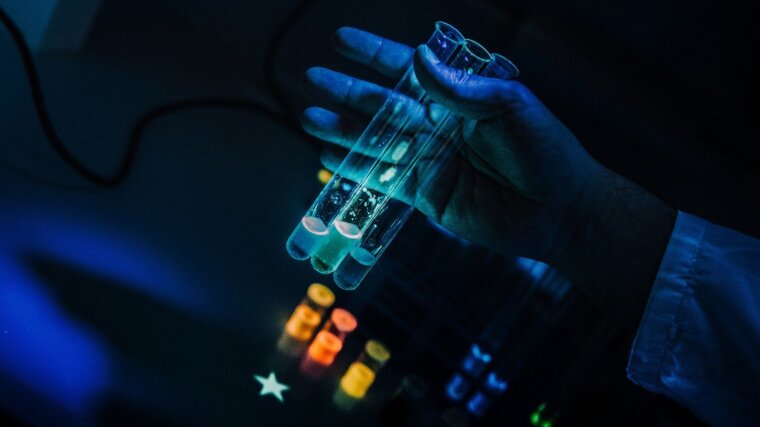
One focal point of our work is the didactic reconstruction of current and highly relevant (chemistry) research areas for schools and student laboratories in the sense of a scientific literacy. Through close collaboration with research groups at the FSU Jena and other cooperation partners, we develop bests-practice teaching projects and materials; at the same time, the relevance of these contents is made clear through systematic connection to school contexts and curricular requirements.
Our model of didactic transfer research provides a guiding framework for our research work; in close cooperation between science and science education groups, we reconstruct current research field for educational contexts. In a cyclical design - consisting of conception, piloting in our school laboratories and partner schools, evaluation and optimization - we collaborate with students and teachers to develop course concepts, teaching formats, experiments and teaching materials that are tested in the field:
Modell der Fachdidaktischen Transferforschung
Image: Timm WilkeWe are currently focusing on two topics in particular:
Research Area 1: Nanoscience Education
One focal point of our research work is nanotechnology. In recent years, a variety of projects, teaching units, course concepts and teaching materials have been developed for schools, student laboratories and teacher training in cooperation with research groups from chemistry and chemistry didactics in Germany and abroad. The projects include experiments with various semiconductor nanoparticles (titanium dioxide, fluorescent zinc oxide), coinage metals (copper, silver, gold) and nanostructured silica and silicone materials.
Ausgewählte Forschungsergebnisse der AG Wilke zum Thema Nanotechnologie
Image: Timm WilkeResearch Area 2: Ecological, Sustainable & Green Chemistry
The second focus currently lies on ecological, sustainable and green chemistry and focuses on relevant issues such as the extraction of (1) energy sources (» second-generation biofuels) and (2) platform chemicals from sustainable sources such as biomass. Furthermore, topics such as (3) recycling of critical (precious) metals from electronic waste or (4) wastewater treatment of heavy metal ions or organic contaminants are investigated.
Ausgewählte Experimente einer Unterrichtseinheit zur Konversion von Biomasse zu Oktan (links); Recycling von Kupfer und Gold aus Elektronikschrott (rechts).
Image: Timm WilkeSynergies
In addition to the content-related overlaps between the two focal points, there are also numerous links between the other research areas in our working group. In order to sustainably implement the developed materials and experiments in teaching contexts as well as in the training and further education of teachers, the results developed here are subsequently embedded, tested and evaluated in (course) concepts for cooperation between schools, student laboratories and universities. In particular, the use of digital tools will be focused on, whereby the potential of low-cost (measuring) devices as well as new teaching formats with new digital media will be used.

